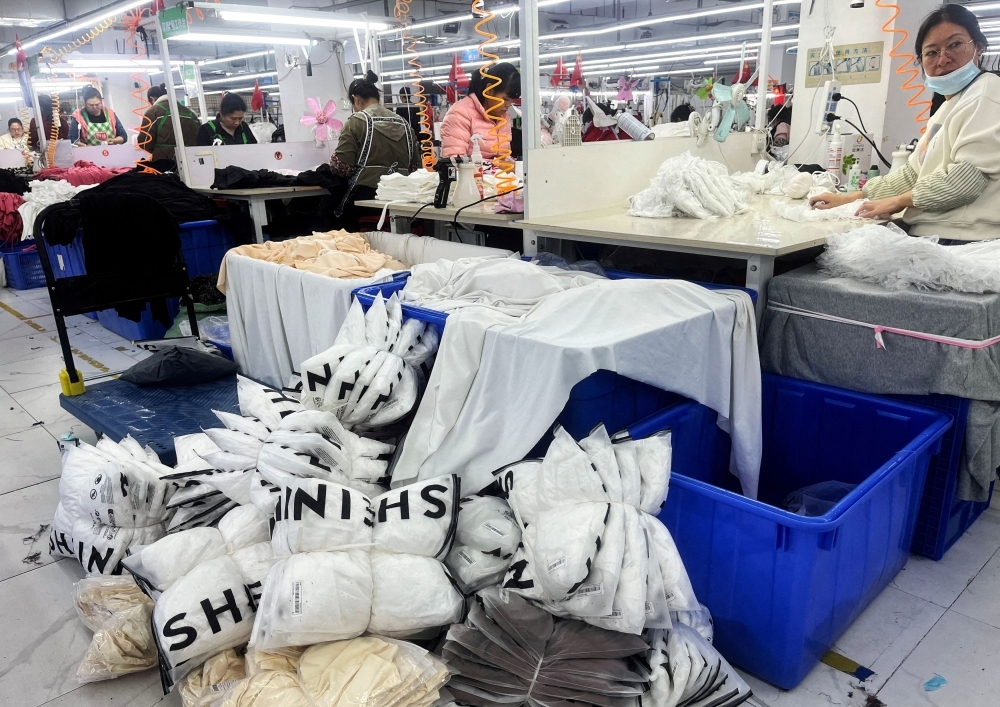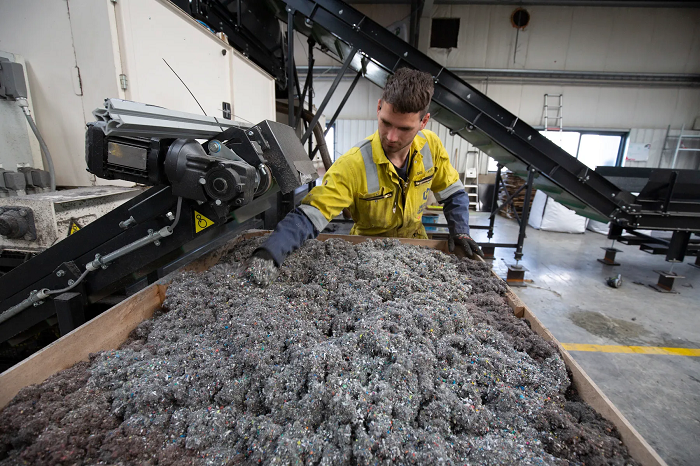FW
UK-based suppliers fear being wiped out as retailers are extending payment terms and cancelling orders. As the UK Fashion and Textile Association revealed, retailers are extending payment terms from 60 to 120 or even 150 days. Suppliers to New Look, a fashion chain with more than 400 stores in the UK, last week received a letter informing them that they would not be paid for orders in production. The firm has temporarily postponed outstanding supplier payments until the Paragon Clothing, which designs, sources and supplies fabrics and clothes for fashion retailers, is also witnessing effective cancellation of an entire season.
Retail chains including Next, have suspended all operations. Arcadia, the fashion empire controlled by Philip Green and his family, is likely to permanently close dozens more of its UK stores. Suppliers fear that financially distressed retailers could go out of business before invoices are settled, leaving them in a long queue of creditors.
Longer payment terms are also causing acute cash flow problems because many smaller suppliers are reporting delays in accessing the government’s coronavirus business interruption loan scheme. Parker Lane Group, which redistributes items that have not sold even after markdowns to regions such as eastern Europe and the Middle East, expects a sharp increase in unsold stock.
XR Fashion Action, a global climate advocacy group has voiced the social injustices that garment workers are facing from fast fashion giants during the COVID-19 pandemic. In an Instagram post, the group highlighted the “humanitarian crisis” that is now unfolding in the industry that has long been laden with environmental and workers rights issues, and named the brands that have cancelled or held orders without payment to already vulnerable groups working in the exploitative garment sector located primarily in Bangladesh and across Southeast Asia.
In an impassioned Instagram post, XR Fashion Action is calling on a number of fashion giants to pay their supply chain workers amidst cancelled orders due to the Coronavirus pandemic. The group referenced a recent Forbes article that revealed the human cost of a number of brands that are now refusing to pay for their cancelled or held-back orders due to a nosedive in demand as daily life comes to a standstill across the world. Many of these orders are already completed or are in production.
Some of these brands include Primark, C&A, Mothercare, Bestseller, Tesco’s F&F Clothing, Marks & Spencer, Kohl’s, Walmart, LLP and JC Penney. Among these, the worst offenders are Primark and C&A, who have cancelled or held orders that are already in production or completed without payment in Bangladesh worth US$273 million and US$166 million respectively.
So far, the brands that have committed to pay what workers in their supply chain are owed include H&M, Inditex (the owner of Zara, Massimo Dutti, Pull & Bear and Bershka among others), Kiabi, PVH, Target and the Nike-owning group VF Corp.
Some smaller independent brands are doing their part too. Ethical custom apparel brand To The Market, for instance, recently made the point to not cancel any orders it has already placed in order to avoid the devastating impacts for the livelihoods of workers down its supply chain. A number of eco-brands have followed these footsteps, including zero-waste brand Tonlé and ethical shopping platform Wearwell.
Thomas Verghese, Former-Chairman, CII Marketing, Retail and Textile Councils
 “Lack of credibility and trust will lead to many large brands looking for alternative sourcing to China but I do not think any country is equipped to replace China including India. India does not have that kind of capacity to feed global demand and are not in a position for bulk manufacturing of normal commodity items. We do more of customized exports. We don’t do manufacturing of bulk items. We don’t have that capacity and infrastructure at the moment. It will take two to four years minimum even if everyone is aligned and the government gives supporting fiscal and tariff benefits. Given the reality of Indian industry and government’s policy support measures, it seems an unrealistic expectation.”
“Lack of credibility and trust will lead to many large brands looking for alternative sourcing to China but I do not think any country is equipped to replace China including India. India does not have that kind of capacity to feed global demand and are not in a position for bulk manufacturing of normal commodity items. We do more of customized exports. We don’t do manufacturing of bulk items. We don’t have that capacity and infrastructure at the moment. It will take two to four years minimum even if everyone is aligned and the government gives supporting fiscal and tariff benefits. Given the reality of Indian industry and government’s policy support measures, it seems an unrealistic expectation.”
What is your observation and understanding of the current turmoil facing the textile industry?
The textile industry has come to a standstill. No activity other than a limited scope of manufacturing masks is on among garmenting. Moreover the textile industry after agriculture is the largest employer and a large number of people in the unorganized sector, don’t have a social security. So a lot of them will be rendered jobless depending upon how proprietor deals with recovery after post lockdown. There will be significant shakedown in the industry after restarting. One can expect a lot of unemployment in the short and medium term. Secondly demand for the textile industry, a discretionary item of purchase will take longer to recover. Both industry and individuals will focus on conserving cash. Therefore, savings will go up while discretionary items will go down in the short to medium term. Short to medium term in conjecturing means at least a year for recovery maybe longer and this has been more or less confirmed by big four consultants like McKinsey, BCG, ATK and APMG all their forecast speak about long term recovery for the industry and definitely textile will not be a priority unless the government provides certain sops to kick-start employment because for the government also large scale unemployment will be a big a challenge.
Thirdly, the impasse between the US and China had already thrown the textile industry in disarray because China is the largest producer of a lot textiles, accounting for almost 25 to 30 per cent of global trade. Already the textile industry over the last year and a half has been experiencing turmoil because of a trade slowdown. China has suffered a lot because of this. It rolled a much lower export income and revenue and that would impact their overall manufacturing operations. It will take some time because now there will be an issue of trust. A lot of people will now have reservations about dealing with China. Unfortunately, China’s place in global community, as a large reliable supplier of textiles cannot be taken up by any country. Weather it is India, Turkey, Vietnam etc, no one is in a position to take on this so called lack of credibility and therefore ,the consequent loss of business for China in a short to medium term basis. Some countries can plan to build capacities but that is a two to four year project. Indian textile industry will see a ripple effect of this.
Will this be an eye opener for India and the rest of the world that they should not be depend on just one country for sourcing. Also, can India emerge a strong alternative sourcing destination?
Lack of credibility and trust will lead to many large brands looking for alternative sourcing to China but I do not think any country is equipped to replace China including India. India does not have that kind of capacity to feed global demand and are not in a position for bulk manufacturing of normal commodity items. We do more of customized exports. We don’t do manufacturing of bulk items. We don’t have that capacity and infrastructure at the moment. It will take two to four years minimum even if everyone is aligned and the government gives supporting fiscal and tariff benefits. Given the reality of Indian industry and government’s policy support measures, it seems an unrealistic expectation. The only country that can gear up in the short term is probably Vietnam because there has been a lot of FDI in textile in the last 5 to 10 years. They are looking at Trans Pacific agreement as the opening a new textile manufacturing hub.
How can the government help in overcoming this challenge?
The government is not playing an active role other than providing new initiatives for technical textiles and India is not really highly placed in the supply chain of technical textile but it is expanding its horizon. That is the main support from this Union Budget. There are a lot of statements about creating global hubs, none of which happened on the scale that it was envisaged, like in China or other countries. The government will need to provide solid support maybe even amend the Amended Technical Upgradation Scheme to include spinning, to cap the limits among other things.
What is your advice to small manufacturers and the industry at large?
Because of demand compression it is more sensible to conserve cash and importantly work on re-development of markets. That will be my first advice to all manufacturers big and small. It has to be across the board we will have to improve quality, improve our propositions and become more competitive.
 China‘s initial experience with COVID-19 highlights some important lessons in supply-chain management. Some of key lessons included sources of supply related to materials, having contingency plans for interruption supply, and understanding the capabilities and vulnerabilities of critical elements within the value chain.
China‘s initial experience with COVID-19 highlights some important lessons in supply-chain management. Some of key lessons included sources of supply related to materials, having contingency plans for interruption supply, and understanding the capabilities and vulnerabilities of critical elements within the value chain.
Crisis to most affect apparel value chain
In future, the global pandemic will have devastating financial implications for entities around the world, with the apparel value chain being one of the most dramatically impacted. The tight-margin, just in time world will present significant risks and challenges to everyone from retail employees to over 40 million factory workers
Business failures and closures will negatively impact individuals at all levels and leave those at the lowest levels of the value chain most at risk, due to the financial structures of developing-world factories and the limited or non-existent social safety nets in those environments.
financial structures of developing-world factories and the limited or non-existent social safety nets in those environments.
Companies to focus on self-preservations
Unlike 2008, the post-pandemic supply chain landscape will not look the same as a significant number of factories will fail, with their workers and capabilities eliminated from the available sources of supply. Companies in the US and Europe will focus on self-preservation by cancelling their orders and delaying shipments and payments.
Hence, there is a need to ensure that companies take into consideration the performance of their factories and suppliers beyond simply price. Ultimately, some of the best partners in the supply chain have invested in critical elements to support the values of their partners be it fire safety, wages or environmental programs.
This is also the time for brands to evaluate the choices they have. They also need to reexamine their choice of partners. Their focus key should be on creating an environment rather than a landfill with creatures in it.
While Bangladesh has compiled data on readymade garment (RMG) order cancellations or postponement, no such data has so far been gathered for the Indian apparel export industry. Hence, management consultancy firm Rajesh Bheda Consulting (RBC) is conducting a survey ‘Measuring impact of the Corona Pandemic on Indian apparel export industry’. The firm has volunteered to capture and collate data on orders postponed or cancelled. It is requesting the members of apparel exporting community to share information about their order status. This will help in creating better understanding of the calamity and communicate to the stakeholders, including buyers, the real impact of such order cancellations or postponement.
The individual survey responses will be kept confidential. Only cumulative and summarised data will be shared so that the members of the industry, government and other stakeholders understand the gravity of the situation.
After having survived Greece’s protracted financial crisis, the textile industry is now going under due to the Covid-19 pandemic. Until a fortnight ago, it still remained a dynamic part of the country’s export industry, representing 10 per cent of total manufacturing exports, channeling 70 per cent of its production to international markets.
However, the industry’s fortunes nosedived over the last 10 days, with four historic textile mills that had endured turmoil in recent years but managed to survive announcing the suspension of operations, placing the jobs and livelihoods of more than 600 workers in doubt. More specifically, on March 18, Nafpaktos Textile Industry in Attica, which has been operating in various legal forms since 1964 and currently employs a total of 161 employees, went out of business.
Four days later, the management of the Varvaressos textile factory in northern Greece decided to suspend operations with the closure of its factories. It employed 227 workers and had thriving exports.
Moreover, recently textile producer Fieratex, also in northern Greece, suspended the work contracts of its staff until May 15. Also on April 1, the Epilektos textile factory in Attica announced the suspension of operations for 45 days. Its 200 employees have been placed on standby. The company started out as a cotton mill in Farsala, central Greece, in 1970 and became one of the most dynamic companies in the industry.
The Bangladesh government led by PM Sheikh Hasina has announced a 50 billion taka ($590 million) incentive package for the country’s garment and other export-oriented sectors to help them cope with the COVID-19 pandemic. Bangladesh’s garment industry, which employs millions of workers, and other industries have been hit hard due to the shutdown in the wake of outbreak. European and American buyers have cancelled orders from Bangladeshi garment factories that were valued at $2.5 billion so far.
The government’s stimulus plan is aimed at offsetting financial loss of the garment and other export oriented industries, the mainstay of the Bangladesh’s economy. The finance ministry has already released some guidelines for the use of the fund. The Bangladesh Bank, the central bank of the country, will issue a circular on the issue soon.
As per the guidelines the money can be used only to pay salaries of the employees to help them tide over the crisis and ensure they remain in the production line to facilitate recovery with the return of normalcy.
Lab-grown cotton and polyester made from air were among the 2020 winners of H&M Foundation’s Global Change Awards. Galy was the grand prize winner of for its Incredible Cotton innovation. The US and Brazil-based startup engineer cotton in a lab, which in turn lessens the burden placed on farmers. This lab-manufactured cotton takes 18 days to produce and releases 80 percent less water and gas emissions.
The program, which is in its fifth year, provides grants and educational resources for entrepreneurs establishing the future of sustainable and innovated fashion. This year, the Foundation received 5,893 entries from 175 countries. The five winners were selected by a panel of experts.
French fashion startup Fairbrics earned €150,000 ($164,000) for its Airwear product that converts greenhouse gas into sustainable polyester. Using literal air, it’s able to produce carbon negative synthetic fibers. Like Galy, the startup was also selected to participate in Fashion For Good’s Accelerator Program this year.
Other Global Change Awards winners include Feature Fibres by Werewool, a US-based startup that creates fabrics from protein DNA with natural colors, stretch and other performance properties. The team was awarded €250,000 ($273,000) for its compostable materials that have a circular life cycle.
Footwear legend Sergio Rossi has died at the age of 84, reportedly from Covid-19, after being hospitalised several days ago. One of the most influential luxury shoe designers of the 20th century, Rossi was born in 1935 in a part of Italy that’s known for its shoemaking expertise, San Mauro Pascoli.
Trained in Milan and Bologna, as well as by his own father, he began his independent business in the early 1950s. And in those early years was best known for the ultra-feminine sandals that he would spend the winter making to sell in beach resorts during the summer season. The brand he founded continues to be known for its exquisite sandals.
Rossi combined both a strong design aesthetic with a technical mastery that also made the label appeal to other fashion brands and saw it collaborating with big-hitters such as Dolce & Gabbana and Gianni Versace. Kering bought control of his firm in 1999 but sold it to private equity giant Investindustrial in 2015. The company relaunched the label in 2016 and has heavily referenced its archive since then, highlighting the enduring appeal of the designs produced under Rossi’s creative control.
Fespa has rescheduled its flagship Latin American event, Fespa Brasil, at the Expo Center Norte, in São Paulo from September 23-25, 2020. The event was earlier scheduled from March 18-21, 2020. It had to be postponed due to the disruption caused by the COVID-19 outbreak.
The event will now feature an expanded daily schedule, allowing visitors more time to enjoy the immersive experience they have come to expect from a Fespa event.
Fespa and APS Eventos Corporativos remain in close contact with exhibitors to ensure they deliver an event that is rewarding and productive in equal measure. All features, conferences and seminars of the event are part of FESPA’s commitment to sharing market insight and sector knowledge that are able to inspire the print community.











